Baby wipes are an essential product in your parenting arsenal. You use them to clean Baby’s itty-bitty tushie, to de-goo sticky fingers on the go, and maybe even fix that pesky mascara smudge. No doubt about it — these veritable multipurpose wet towelettes can be a lifesaver in many ways, on many different occasions.
On the flip side, of course, is the unfortunate fact that they are generally considered not so great for Mother Nature. Many traditional types of baby or wet wipes contain bits of plastic in them (alarming but true), so they never completely break down. If they get into a sewer system, they can, over time, mix with food waste and oil to create huge blockages otherwise known as “fatbergs.” What’s more, the resulting microplastic bits can find their way into the ocean and create a threat to marine life. They eat the plastic particles — and, guess what? If you eat fish, you may be consuming some plastic, too.
So what is a wipe-loving, Earth-conscious caregiver to do? One option is to consider using and washing reusable cloths — an admittedly inconvenient but decidedly resourceful idea. Of course, if you go through a pack of wipes like most parents do, you will likely prefer this more practical but still sustainable alternative: Biodegradable wipes.
Thinking about making the switch? Here is what you need to know.

What exactly are biodegradable wipes?
Biodegradable baby wipes offer a more eco-friendly option; made with natural, organic, and plant-based ingredients, they eventually break down into smaller elements that return to the earth. Of course, there are several caveats to consider when choosing biodegradable wipes — and not all types and brands are created equal.
What to look for in biodegradable wipes?
Lots of brands claim that their wipes are “natural,” but let us be clear: That is a subjective and unregulated term. When shopping for biodegradable wipes, there are some specific things to look out for:
- Most biodegradable wipes are made using plant fibers, so in addition to being environmentally friendly, they are also, generally, considered a safe and hypoallergenic option — gentle on Baby’s delicate skin. They may also contain viscose material, organic cotton, or bamboo.
- You want to find a biodegradable wipe that contains no plastic, no chemicals, and is mostly composed of water. For example, these Buy at Amazon wipes are composed of 98.5 percent pure water.
- Many biodegradable wet wipes contain essential oils as a safe alternative to synthetic ingredients and added fragrances. These Buy at Amazon are infused with a natural essential oil to give them a subtle but refreshing scent.
- Ideally, biodegradable wipes should have a COSMOS certification; this means that they contain a minimum of 95% plant-based ingredients.
- You also want to do your due diligence when purchasing wipes and check how long it will actually take for them to fully decompose or biodegrade. Suffice to say, it defeats the purpose if a wipe will be lying around in a landfill for years to come. For example, Buy at Amazon wipes claim to biodegrade within 60 days.
- A really important point to understand? Biodegradable wipes are not the same as flushable wipes. Yes, biodegradable wipes will eventually break down, but that does not mean you want them to do that in your pipes or sewer system. (FYI, even if a wipe package is labeled as “flush friendly,” avoid putting them in the toilet — or risk an eventual plumbing problem.)
- Most biodegradable wipes should be thrown out in the regular garbage. Some options can go in a compost bin.
Ready to do your part to help Mother Nature while keeping your baby’s bottom fresh and clean? Biodegradable wipes might be the conscientious answer you are looking for. Plus, they will keep your little one’s sensitive skin protected. (It is a win-win, really.) You can feel good knowing that these plant-based sheets won’t clog up pipes, accumulate in landfills, or harm marine life — so go ahead and wipe to your heart’s content!


